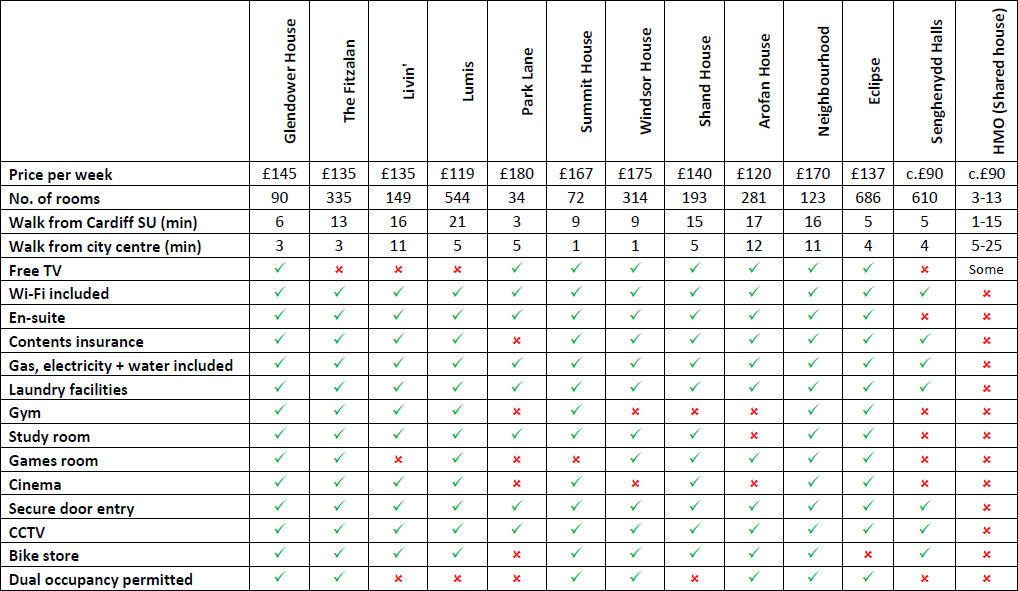
Is the rapid rise of city centre student living in Cardiff a cause for concern?

The number of students living in private sector, purpose-built accommodation in the UK has more than doubled since 2007. CPS Homes estate agents assess what impact the vast number of new blocks is having on our capital city’s landscape and ask whether Cardiff’s traditional student house-share landlords should be worried.
'Upmarket' and 'luxury' are terms that one wouldn’t typically associate with student accommodation in Cardiff. 24-hour concierges, on-site gyms and private cinema rooms haven’t exactly featured large in the student rooms of old.
Such inducements are increasingly part of the offering from Purpose-Built Student Accommodation (PBSA) in city centre locations across Britain’s university towns and cities. It’s a growing market that saw an injection of £6 billion in 2015 according to Savills, and is seen as an increasingly attractive option to global private equity firms.
According to property consultant Knight Frank, the number of students living in private sector PBSA has more than doubled since 2007. In Cardiff alone, an estimated 1,700 PBSA rooms have been completed in the past 5 years, with planning permission granted for a further 5,000, 2,000 of which are midway through being built at the time of writing.
So what does this mean for the more traditional student house-shares, commonly known as HMOs, in Cardiff’s most student-populated areas like Cathays and Roath?
Cost is crucial
"The big, purpose-built student blocks worry me," says Wyn Jones, owner and developer of a number of student properties in Cathays. "There are big blocks coming out of the ground everywhere – some with 500+ rooms – and I’ve no idea where the tenants to fill them will come from. Surely the market for that product will soon be saturated?"
Yet, as Wyn points out, there is no negative impact on his investments as yet. "At the same time, my rental income in Cathays keeps increasing, which is puzzling," he says.
According to Barrie James, director of CPS Homes, HMOs within key student areas like Cathays and Roath will remain in high demand for two main reasons: price and location.
"Price is crucial. While there remains a significant disparity between the cost of renting a typical HMO and the cost of renting in one of these new city centre blocks, students will always favour the traditional HMO because cost is king," says Barrie.
"The cheapest room in a new PBSA block in Cardiff is £135 per week. Whilst that tends to include all bills, it’s still considerably more than the typical £310 per month (excluding bills) that students pay in a private Cathays house-share. Even houses at the higher-end of the market, such as newly-refurbished properties fetching £375 per month excluding bills, are still cheaper than the PBSA offerings."
Cost aside, students also rank location high on their list of priorities when it comes to choosing accommodation.
“After price, students always tell us that they want to be within easy access of university – which usually means no more than a 10-minute walk. Many of the PBSA blocks going up in the city centre don’t match this criterion, and whilst some students may like the idea of living in the heart of the city centre, for a lot, it’s not practical for their studies. So if they haven’t already been ruled out because of price, then awkward location is likely to be the reason," Barrie continues.
"What shouldn’t be overlooked is that Cathays and Roath are sewn into student folklore – at least for British students. They’re desirable places to live because they have history and because they’ve developed to cater for students’ every need. Students arrive in Cardiff from all over the country having heard tales from friends and relatives who have passed through these areas in the past, so they want to enjoy and potentially recreate these experiences for themselves. To suddenly be shipped off to the city centre doesn’t sit well with them.”
Here's just a selection of the purpose-built student blocks in Cardiff and what each one offers compared to traditional student house-shares:

Overseas student demand
So if British students are being priced out of the PBSA market and find a lot of their locations unappealing, who is occupying the new rooms?
The arrival of this upmarket type of student accommodation has coincided with a rise in the number of overseas students studying in Cardiff, who tend to arrive with bigger budgets and more of a preference to live in the hotel-style rooms on offer.
According to UCAS, the higher education application processor, the number of EU students placed at UK universities for the 2016-17 academic year was up nearly 8 per cent year-on-year, while the number of international students coming from outside of the EU has risen 48 per cent in the last 10 years.
Here in Cardiff, our three universities – Cardiff University, Cardiff Metropolitan University and the University of South Wales – continue to attract more and more students every year, not least due the vast sums of money spent on the development of Cardiff University in recent years, including the creation of its new Maindy Park campus.
The biggest portion of non-EU students studying in Cardiff come from China. Victor Wei Luo, former Vice President of Cardiff University’s Chinese Society, says: "China is getting richer and richer, and the Chinese students who choose study in the UK are mostly supported by their parents back home.
"House prices in the UK are lower than that of Beijing, Shanghai and Guangdong in China. I’ve known some of the richest of students buy a house to live in while studying in the UK, rather than rent," says Victor.
As well as financial backing from parents, international students can also arrive in the UK with scholarships or sponsorships from their country’s government or major companies, meaning they find the cost of living considerably easier than many of their UK counterparts.
"The UK is one of the most popular countries for Chinese students because the English language requirement is lower than in, say, the USA," Victor says. "A student entering the UK with next-to-no grasp of the language can apply for a 12 week pre-sessional English class over the summer and, at the end of it, pass an internal exam to get qualified for full university entry."
The student verdict
 The layout and makeup of the new purpose-built student blocks tend to be virtually identical across all developments; a studio-like bedroom with en-suite bathroom and private kitchen, providing ample desk space for studies.
The layout and makeup of the new purpose-built student blocks tend to be virtually identical across all developments; a studio-like bedroom with en-suite bathroom and private kitchen, providing ample desk space for studies.
This means no living room, with developers preferring to provide communal living spaces on one or more floors of the building. Other standard offerings are CCTV, bicycle storage and secure door entry system, with some going further and laying on gyms, communal study areas, games rooms or cinema rooms for their residents. All blocks boast high-speed Wi-Fi and utility bills included in the rent.
So are Britain’s students changing in their habits? Not if the ones we spoke to are to be believed.
"All these private accommodation companies come up with new, flashy designs with built-in gyms and cinemas and bars, raising the price of accommodation even further, and it’s a joke," says second-year student Charlotte Amodeo, who lives in a privately owned house-share in Adamsdown.
"Students should not have to pay £500 a month for all this stuff we don’t need. Plus you can’t breathe in these places because there’s no ventilation, and with everyone squashed in like sardines it creates an atmosphere for drama."
Third-year student Dafydd Charles, who occupied one of Cardiff’s first PBSA schemes in his second-year before opting for a four-bedroom house-share this year, believes much of what they have to offer is overplayed and underused.
"In the development I lived in, I rarely saw people socialising in the living area provided on the first-floor. You want to be in your own personal environment to do that, not on what was effectively a landing. By comparison, in the house I live in now, my housemates and I are always together in the kitchen/lounge," he says.
"I think a lot of what the new blocks offer are ghost-town gimmicks. We had what was labelled a 'cinema room' in our building and I never once saw anybody in there.”
Undergraduate Harry Riach, who also lives in a HMO, believes that PBSA serves a purpose up to a point, but that sharing a house is part of the student experience.
"I think that any purpose-built student accommodation is very good for bonding and building friendships in your first year," she says. "However, I think that so-called luxury accommodation won’t change the fact that there are hundreds of students packed into a very small space in their first years of freedom, and the fallout from that freedom will possibly alter the 'luxury' status after the first few months.
"Getting a house is scary, but aside from price reasons, getting one is a rite of passage as you’re dealing with bills and rent; it’s practice for getting a place after university."
Victor Wei Luo suggests that to some overseas students, a lack of communal space is no bad thing. "The language barrier can be a problem for overseas students, meaning they may prefer to occupy their own private space, rather than share kitchens and bathrooms," he says.
"It's also worth bearing in mind that foreign students coming to the UK want to embrace the culture and do a lot of sightseeing whilst here, so living in the city centre is a bonus. They don’t all return home for Easter and Christmas like the British students do, so having everything on their doorstep – particularly at these times – is important."
Changing the face of Cardiff
 Property consultant, Knight Frank, views all UK core university cities as "structurally under-supplied" in terms of their PBSA offerings. In a bid to put this right, everywhere you look these days there are cranes in Cardiff city centre. The chances are, if it’s not near to Central Station’s commercial makeover, then it’s another block of student pads going up.
Property consultant, Knight Frank, views all UK core university cities as "structurally under-supplied" in terms of their PBSA offerings. In a bid to put this right, everywhere you look these days there are cranes in Cardiff city centre. The chances are, if it’s not near to Central Station’s commercial makeover, then it’s another block of student pads going up.
"In recent years there has been a rise in planning applications for proposed private sector student accommodation and we do have more in the pipeline, but they won’t all come to fruition," says Cllr Ramesh Patel, Cabinet Member for Transport, Planning and Sustainability.
"It’s also worth pointing out that compared to other cities of a similar size we have relatively fewer students in this type of accommodation. We judge each planning application on its merits."
What does the future hold?
With a pipeline that’s currently 5,000 rooms strong and similar planning applications continuing to be submitted on what feels like a monthly basis, don’t expect the vast amount of construction sites on display in the city centre to disappear any time soon.
So is Cardiff likely to reach its PBSA saturation point?
"We will inevitability get to that stage", says Barrie. "With all the schemes planned, I don’t see how each one can continue to request these high sums of rent and expect full occupancy. Something’s got to give, and I expect to see prices drop by 30-40% in a bid to attract students and ensure all rooms are filled. Without that, or without a contingency plan like offering them as one and two-bedroom professional flats in the future, the people with large sums of money invested in these projects will scream and heads will roll."
If prices do fall, the fear among some landlords is that this will affect the traditional student house-shares.
"Outside of Cathays and Roath, the areas currently benefitting most from student tenants are Splott and Adamsdown, Cardiff Bay, and the few city centre buildings that have been up for many years – half of which appear to be let to wealthy, overseas students," Barrie says.
"A large proportion of Splott and Adamsdown tenants are students who attend University of South Wales’ ATRiuM building nearby, but I don’t expect to see this market affected because living in these areas is already considerably cheaper than living in Cathays and Roath, never mind the new purpose-built blocks.
"On the flipside, living in Cardiff Bay and the likes of David Morgan Apartments, Landmark Place and Altolusso in the city centre costs substantially more – sometimes more than what the new student blocks are asking for – so it wouldn’t surprise me if the students living in these developments move across to the new schemes. Students make up 10% of our tenants in the Bay and 35% in the city centre, so if even half of them decide to move, it’ll free up a good number of properties for the likes of working professionals to move into; increasing supply but at the same time affecting demand, so perhaps we won’t see Bay and city centre rents rising quite as much as years gone by", Barrie concludes.
And what of Cathays and Roath, the most-populated student areas?
"Cathays and Roath will remain unaffected by PBSA. If you, as a landlord, have a good quality property that will always attract tenants, I don’t see that changing and your rent will continue to go up year-on-year. Students want to live with friends in a comfortable, social environment close to university, and nothing is going to change that,” Barrie predicts.
"And with Cardiff Council recently putting new planning guidance in place to vastly limit the creation of new HMOs in the areas because they believe there are too many already, it’s done current landlords a big favour because it’s preserved their status moving forward.
"There’s almost an exclusivity or premium on these properties now – in both lettings and sales terms. In the last year, we’ve seen house values go up by 16% despite the new 3% stamp duty surcharge on buy-to-let purchases.”
Are you looking for a student property to rent in Cardiff, or perhaps you're a landlord looking to rent out your property? If so, our experienced lettings and students teams can help. To find out more about our services and properties, get in touch today on 02920 668585, email enquiries@cpshomes.co.uk, or pop into our Woodville Road branch in the heart of Cathays.
The information contained within this article was correct at the date of publishing and is not guaranteed to remain correct in the present day.


